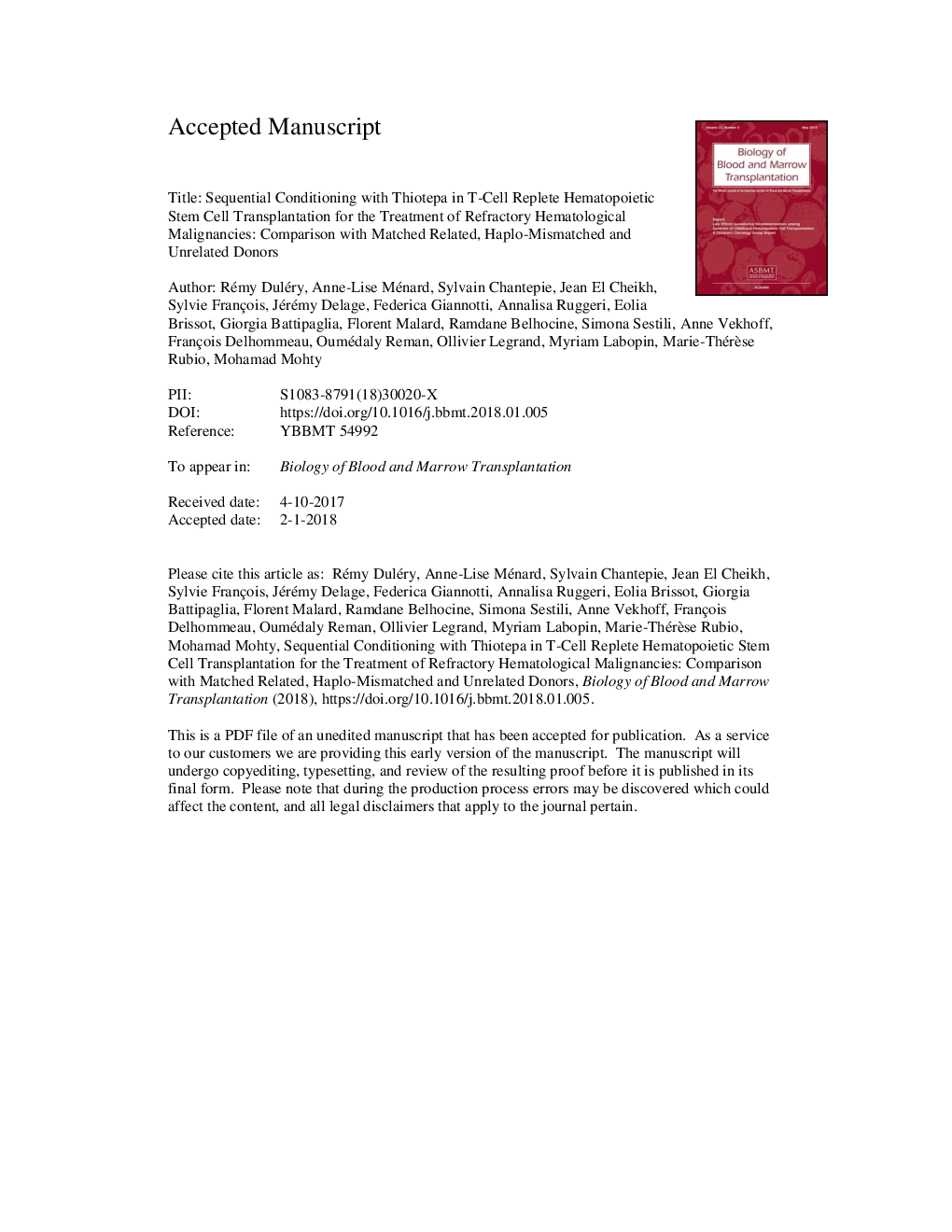| کد مقاله | کد نشریه | سال انتشار | مقاله انگلیسی | نسخه تمام متن |
|---|---|---|---|---|
| 8429989 | 1546228 | 2018 | 24 صفحه PDF | دانلود رایگان |
عنوان انگلیسی مقاله ISI
Sequential Conditioning with Thiotepa in T Cell- Replete Hematopoietic Stem Cell Transplantation for the Treatment of Refractory Hematologic Malignancies: Comparison with Matched Related, Haplo-Mismatched, and Unrelated Donors
ترجمه فارسی عنوان
تهیه شده با ترشحات با تیوتاپا در ترمیم سلولهای بنیادی هماتوپوئیت سل تک سلولی برای درمان بدخیمیهای هماتولوژیک نسوز: مقایسه با اهداکنندگان متقابل، هپلو مینماید و ناخوشایند
دانلود مقاله + سفارش ترجمه
دانلود مقاله ISI انگلیسی
رایگان برای ایرانیان
کلمات کلیدی
پیوند هپاتولوژیک، تهویه مطبوع، بدخیمی خونگرم مقاوم در برابر، آنتی بادی گلوبولین،
موضوعات مرتبط
علوم زیستی و بیوفناوری
بیوشیمی، ژنتیک و زیست شناسی مولکولی
تحقیقات سرطان
چکیده انگلیسی
The results of conventional allogeneic stem cell transplantation (SCT) in refractory hematologic malignancies are poor. Sequential strategies have shown promising results in refractory acute myelogenous leukemia (AML), but have not been validated in a haploidentical (Haplo) transplant setting. We have developed a new sequential approach combining chemotherapy with broad antitumor activity (thiotepa 10âmg/kg, etoposide 400âmg/m2, and cyclophosphamide 1600âmg/m2 from day -15 to day -10), followed after 3 days of rest by a reduced-intensity conditioning regimen (fludarabine 150âmg/m2, i.v. busulfan 6.4âmg/kg, and thymoglobulin 5âmg/kg from day -6 to day -2). High-dose post-transplantation cyclophosphamide was added in cases with Haplo donors. Seventy-two patients (median age, 54 years) with a refractory hematologic malignancy (44 with acute myelogenous leukemia, 7 with acute lymphoblastic leukemia, 15 with myelodysplastic syndrome/myeloproliferative neoplasms, and 6 with lymphomas) were included in this retrospective multicenter study. Donors were Haplo (nâ=â27), matched related (MRD; nâ=â16), and unrelated (UD; nâ=â29). With a median follow-up of 21 months, the 2-year overall survival (OS) and event-free survival (EFS) were 54.7% and 49.3%, respectively, in recipients of Haplo transplants, 49.2% and 43.8%, respectively, in recipients of MRD transplants, and 37.9% and 28%, respectively, in recipients of UD transplants. Compared with UD, the outcomes were improved in Haplo in terms of the incidences of acute grade II-IV graft-versus-host disease (GVHD) (11.1% versus 41.4%; Pâ<â.001) and GVHD-free, relapse-free survival (44.4 versus 10.3%; Pâ=â.022). These results support the safety and efficacy of a thiotepa-based sequential approach in allogeneic SCT with a Haplo donor with post-transplantation immune modulation. Thus, in patients with refractory hematologic malignancies, there seems to be no benefit in searching for a UD when a Haplo donor is readily available.
ناشر
Database: Elsevier - ScienceDirect (ساینس دایرکت)
Journal: Biology of Blood and Marrow Transplantation - Volume 24, Issue 5, May 2018, Pages 1013-1021
Journal: Biology of Blood and Marrow Transplantation - Volume 24, Issue 5, May 2018, Pages 1013-1021
نویسندگان
Rémy Duléry, Anne-Lise Ménard, Sylvain Chantepie, Jean El-Cheikh, Sylvie François, Jérémy Delage, Federica Giannotti, Annalisa Ruggeri, Eolia Brissot, Giorgia Battipaglia, Florent Malard, Ramdane Belhocine, Simona Sestili, Anne Vekhoff,
